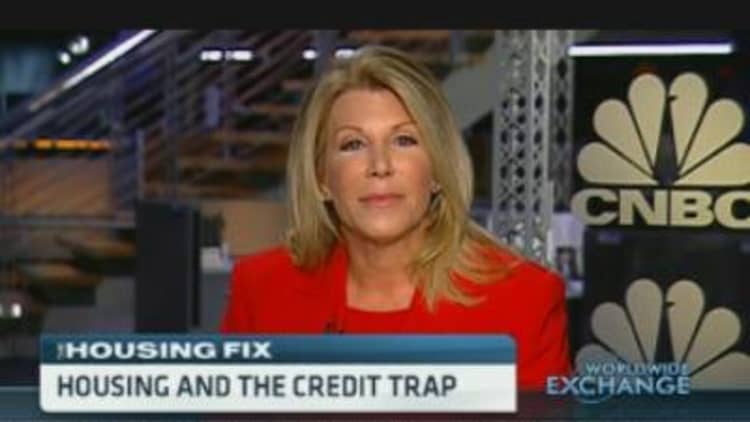After using their homes as piggy-banks during the housing boom, more Americans are now doing the opposite: putting more cash into their house in order get a better mortgage rate—and possibly a better return than stocks and bonds.
"If someone is going to stay in their home and they can get a lower interest rate by using their own cash for refinancing, they can get a decent rate or return," says Mark Goldman, a professor of real estate at San Diego State University. "In some cases that return could be as high as 18 or 19 percent."
The trend—called cash-in refinancing—simply means homeowners put more cash into their house to make up for the equity they've lost during the recent housing collapse. This allows them to qualify for refinancing to get a lower mortgage rate—and lower monthly payments. Most lenders require 20 percent equity to refinance and with home values decreasing over the last couple of years, many borrowers are equity 'short.'
More homeowners appear willing to come up with the extra cash.

The latest statistics from Freddie Mac show that 22 percent of all refinancing in the second quarter of 2010 were cash-ins. That ties the third highest level of cash-ins since Freddie began keeping records of refinancing patterns in 1985.
"We're expecting the numbers of cash-ins to grow or at least stay at the same high level going forward," says Frank Nothaft, chief economist at Freddie Mac. "The record low interest rates are primarily what's behind it."
Other reasons for cash-in refis include getting rid of private mortgage insurance for loans that are more than 80 percent of the home value, reducing a mortgage term, say from 30 years to 15, and closing out a jumbo mortgage that carries higher rates than conventional loans.
To figure out if a cash-refi is right or not, it comes down to doing the math, says Bob Walters, chief economist at QuickenLoans.com.
"If someone bought a house for $150,000 at a 30-year fixed at 6 percent ago and paid 20 percent down, they'd owe $120,000 on the mortgage," Walters explains. "Then the house fell in value to $110,000, you still owe $10,000 more than it's worth. But if you have the ten thousand to get to a 4 and 1/4 interest rate, your mortgage payment will go down signifcantly. That could be a higher rate of return than if that $10,000 was sitting in a bank, cd or even some stocks."
It doesn't matter if prices go down, the trade off is still good if you continue to make your payments. You are dropping your interest rate and monthly housing costs. That return on investment is something that's not speculative."CEO, Luxury MortgageDavid Adamo
And as an investment, homeowners don't need to worry about housing prices falling even further says David Adamo, CEO of Luxury Mortgage—as long as they keep paying the loan.
"It doesn't matter if prices go down, the trade off is still good if you continue to make your payments," Adamo says. "You are dropping your interest rate and monthly housing costs. That return on investment is something that's not speculative."
But even after doing the math, cash-in refinance comes down to how much money a homeowner can afford—and how long they plan to stay in the home.
"The downside to this is, if you need to have a lot of cash on hand for future spending, this could reduce your liquidity," says SDSU's Goldman. "People have to have money available to do it. The other point to make is that if you're not planning to spend the next 5,6 7 years in the house, it's not right either. There would be no reason to put money in a house you're not going to stay in over time."
"It's not for everyone," QuickenLoans' Walters goes on to say. "You have to figure out the closing costs for refinancing and the fact that you would also have lower mortgage interest deductions at tax time. But the math is compelling if you can come up with the cash."


